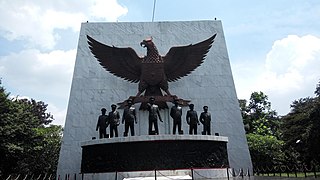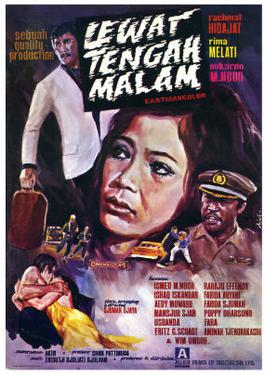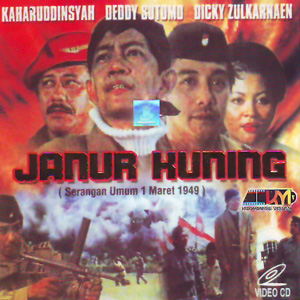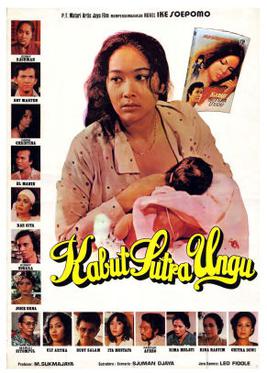Production
Serangan Fajar was directed by Arifin C. Noer and produced by Brigadier General G. Dwipayana of the state-run, Jakarta-based production house PPFN. Arifin wrote the script on his own and during production M Soleh Ruslani handled cinematography. The completed film was edited by Supandi, while Noer's brother Embie provided music. Antonius Yacobus starred as Suharto, Dani Marsuni as Temon, and Amoroso Katamsi as Romo. Other cast members included Noer's wife Jajang, Charlie Sahetapy, and Suparmi.
Serangan Fajar used traditional wayang imagery. Scholar of Indonesia Donald K. Emmerson suggests that this was to legitimise then-president Suharto and emphasise the story's heroism.
Three World War II Japanese aircraft replica were made for the purpose of this film. They were made to represent scenes of the first combat sortie of Indonesian Air Force on 29 July 1947. Those aircraft were two Yokosuka K5Y Cureng and Mitsubishi Ki-51 Guntei. Their frame were made from wood with aluminium skin. One of the Cureng were equipped with a Volkswagen engine so it can rotate its propeller. [4]

The Thirtieth of September Movement was a self-proclaimed organization of Indonesian National Armed Forces members. In the early hours of 1 October 1965, they assassinated six Indonesian Army generals in an abortive coup d'état. Later that morning, the organization declared that it was in control of media and communication outlets and had taken President Sukarno under its protection. By the end of the day, the coup attempt had failed in Jakarta. Meanwhile, in central Java there was an attempt to take control over an army division and several cities. By the time this rebellion was put down, two more senior officers were dead.

Arifin Chairin Noer was an Indonesian poet, theater director and film producer.

Pacar Ketinggalan Kereta is a 1989 film by Indonesian director Teguh Karya. It was his last feature film.
![<i>Rentjong Atjeh</i> 1940 [[Dutch East Indies]] film](https://upload.wikimedia.org/wikipedia/commons/thumb/b/b4/Rentjong_Atjeh_ad%2C_Star_Magazine_2.20_%28August_1940%29%2C_p50.jpg/320px-Rentjong_Atjeh_ad%2C_Star_Magazine_2.20_%28August_1940%29%2C_p50.jpg)
Rentjong Atjeh is a 1940 action film from the Dutch East Indies directed by The Teng Chun. Telling of a group who take revenge against pirates in the Strait of Malacca, it starred Ferry Kock, Dewi Mada, Bissoe, Mohammad Mochtar, and Hadidjah. It was filmed near the shore in Batavia and reused footage from The's earlier work Alang-Alang (1939). Rentjong Atjeh, inspired in part by the Tarzan films, was a commercial success, although it may now be lost.

Lewat Tengah Malam is a 1971 Indonesian film and the first feature-length production by director Sjumandjaja. Starring Rachmat Hidayat, Rima Melati, and Soekarno M. Noer, it follows a thief named Lono who steals from the corrupt to give to the poor. The film, which may have been influenced by The Thomas Crown Affair (1968), was reportedly very tiring for the director, who briefly considered never directing again. The social realist elements led to Suharto's New Order government keeping Sjumandjaja under surveillance.

Budak Nafsu is a 1983 Indonesian film directed by Sjumandjaja and adapted from the 1981 novel Fatima by Titie Said. Starring Jenny Rachman and El Manik, it follows a mother who is forced to serve as a comfort woman for Japanese men stationed in British Malaya in an effort to save her daughter. The film was a commercial success, although critics have emphasised its sexual aspects.
Salah Asuhan is a 1972 film directed by Asrul Sani, produced by Andy Azhar, and starring Dicky Zulkarnaen, Ruth Pelupessy, and Rima Melati. Adapted from Abdoel Moeis' 1928 novel of the same name, it tells of a man who betrays his upbringing for the metropolitan life, while at the same time marrying an Indo woman instead of the one chosen by his mother.
Sam Pek Eng Tay is a 1931 film directed and produced by The Teng Chun and released in the Dutch East Indies. It is based on the Chinese legend The Butterfly Lovers, which follows the doomed love between a rich girl and a commoner boy. The film was a commercial success, inspiring The Teng Chun to direct several further films based on Chinese mythology. The name derives from the given names of the legend's two main characters, Liang Shanbo (梁山伯) and Zhu Yingtai (祝英台).

Pengkhianatan G30S/PKI is a 1984 Indonesian docudrama co-written and directed by Arifin C. Noer, produced by G. Dwipayana, and starring Amoroso Katamsi, Umar Kayam, and Syubah Asa. Produced over a period of two years with a budget of Rp. 800 million, the film was sponsored by Suharto's New Order government. It was based on an official history of the 30 September Movement coup in 1965 written by Nugroho Notosusanto and Ismail Saleh, which depicted the coup as being orchestrated by the Communist Party of Indonesia.

Janur Kuning is a 1980 Indonesian war film directed by Alam Surawidjaja and produced by Abbas Wiranatakusuma. Starring Kaharuddin Syah, Deddy Sutomo, and Dicky Zulkarnaen, it follows the Indonesian revolutionaries six-hour assault on Yogyakarta, under Suharto, in a show of force against the Dutch army. At the time the most expensive domestic production ever, the film's title is meant to symbolise the Indonesian people's struggle. A critical success, Janur Kuning received a nomination and two special awards at the 1980 Indonesian Film Festival. It was screened annually on 1 March between 1980 and 1998, but has since been criticised as an attempt to manipulate history and create a cult with President Suharto in the centre.

Brigadier General Raden Panji Nugroho Notosusanto was an Indonesian short story writer turned military historian who served as a professor of history at the University of Indonesia. Born to a noble family in Central Java, he exhibited a high degree of nationalism from a young age. During the Indonesian National Revolution from 1945 to 1949, he saw active service as a member of the Student Army, working reconnaissance. Despite wanting to remain in the military, under the influence of his father he continued his education, eventually enrolling in the faculty of literature at the University of Indonesia. During the 1950s he wrote extensively and was active in numerous political and academic groups, finally graduating with a degree in history in 1958.

Pengantin Pantai Biru is a 1983 film directed by Achmad Salim, produced by Ferry Angriawan, and starring Meriam Bellina and Sandro Tobing. It follows two castaways, children who grow up with one of their fathers but must fend for themselves after they are captured and deified by natives. Adapted from Henry De Vere Stacpoole's novel The Blue Lagoon, via the film of the same name, Pengantin Pantai Biru introduces several differences to the story.

Enam Djam di Jogja is a 1951 Indonesian film directed by Usmar Ismail. It was the second film to be produced under the PERFINI banner. Detailing the show of force in which the Indonesian republican army retook the capital at Yogyakarta for six hours, the film utilised much of the cast and crew from Ismail's previous work Darah dan Doa (1950). The film was a success in Indonesia and continued to be screened on the state television channel into the 1980s, even after two further films about the event were released.

Ponirah Terpidana is a 1984 Indonesian drama film directed by Slamet Rahardjo. Starring Nani Vidia, Rahardjo, and Ray Sahetapy, it follows a young woman named Ponirah who becomes a prostitute and is arrested for the murder of a rich businessman. The film, which combined traditional and contemporary elements, was a critical success in Indonesia. It won three Citra Awards at the 1984 Indonesian Film Festival, from a total of eleven nominations.

Kabut Sutra Ungu is a 1979 Indonesian film directed by Sjumandjaja and starring Jenny Rachman, Roy Marten, and El Manik. Adopted from the novel of the same name by Ike Soepomo, it follows a young widow who must overcome various obstacles before marrying again.
Nico Pelamonia was an Indonesian actor turned film director who won the Citra Award for Best Director in 1976 for his film Semalam di Malaysia. He has been involved in 33 feature film productions since his debut in Fred Young's Dibalik Awan in 1963.

Ellisa Meriam Bellina Maria Bamboe, or better known by her stage name as Meriam Bellina, is an Indonesian actress who has won three Citra Awards and acted in more than 50 films. Born and raised in Bandung, she dropped out of senior high school to begin a career as a model and actress. By the mid-1980s she was recognised as a "sex bomb" and "fantasy girl". During the 1990s she focused mostly on television series, but she has produced several feature films since 2007. She is known to have mixed Austrian and Bugis Bone blood.
Elang Darat is a 1941 film from the Dutch East Indies which was directed by Inoe Perbatasari and produced by The Teng Chun for Jacatra Film. A detective film, it follows a man who comes to a village to track the villainous bandit known only as "Elang Darat".

Air Mata Mengalir di Tjitarum is a 1948 film from what is now Indonesia, written and directed by Roestam Sutan Palindih for the Tan & Wong Bros Film Company.

Amoroso Katamsi was an Indonesian actor and artist. He is well known by Penumpasan Pengkhianatan G 30 S PKI created in 1982 by director, Arifin C. Noer and by Djakarta 1966 supported by Umar Kayam with same director. He became chief of PARFI.



![<i>Rentjong Atjeh</i> 1940 [[Dutch East Indies]] film](https://upload.wikimedia.org/wikipedia/commons/thumb/b/b4/Rentjong_Atjeh_ad%2C_Star_Magazine_2.20_%28August_1940%29%2C_p50.jpg/320px-Rentjong_Atjeh_ad%2C_Star_Magazine_2.20_%28August_1940%29%2C_p50.jpg)











